How to Get Residency in Spain
A Complete Guide to Spanish Residency Find out all the available optionsAsk our lawyers anything!How to get the Spanish residency
But, how to do it? If you are considering moving to Spain, in this guide you will find everything you MUST know. What are the residence permit options for non-EU citizens in Spain? And if you are from the EU? How to get residency in Spain and what are the requirements?
Trying to answer these questions may sound intimidating, especially because there are plenty of alternatives and the process + requirements differs according to the one you choose. But after reading this guide all your doubts will be over. We will help you find which residence permit suits you (and your family) best, so that you can fully understand all the steps to follow.
- We will carefully analyze your situation and determine which is residence permit is right for you
- We will guide you step-by-step into all the legal procedures required to get your permit in Spain
- We will help you get all the documents and send them to the relevant authority for you. All you’ll have to do is sign, we’ll handle the rest!
1-on-1 consultation to understand how YOU can obtain residency
✓ We will assign you an expert immigration lawyer
✓ We will carefully analyze and study your situation
✓ Together, we will define what the best path is for you (and your family) to obtain residency in Spain
✓ We will outline the exact steps you must follow and answer any questions that may arise
1-on-1 consultation to understand how YOU can obtain residency
✓ We will assign you an expert immigration lawyer
✓ We will carefully analyze and study your situation
✓ Together, we will define what the best path is for you (and your family) to obtain residency in Spain
✓ We will outline the exact steps you must follow and answer any questions that may arise
4 Types of Residency Authorizations in Spain:
If you are planning on visiting or moving to Spain, you must be aware that there are 4 different types of permits or authorizations that will allow you to legally stay in the country. Choosing one or the other will depend on how long you plan to stay in the Spanish territory, or how long have you already been in the country:
Short-term Visa
The short-term visa or Schengen visa (also called a tourist visa) allows non-EU citizens to stay in the country for up to 90 days. Depending on your country of origin, you may be required to apply for one or not. Once those 90 days come to an end, you must move to a regular permit in order to stay in Spain. But bear in mind that the vast majority of permits can’t be obtained under a tourist visa. This means that, as a general rule, you can’t come to Spain with a short-term visa and get your residence permit afterwards; you need to apply from your country of origin. Nevertheless, there are some exceptions that we will explore later on.
Temporary Residence Permit
If you are planning to live in Spain for more than 90 days, you must apply for a temporary residency permit. Temporary residencies last 1,2,3 or 4 years (depending on the permit and if it is an initial residency or a renewal). But, usually, initial cards are for 1 year under the general immigration regime, and 3 years under the Entrepreneur’s law. Once that period ends, and provided that you still meet the initial requirements, you can renew your temporary residence permit for an additional two years. On the other hand, instead of renewing, you will also have the possibility of moving to a different type of residency. Finally, bear in mind that not all permits do allow you to work in Spain.
Long-Term Residency
After 5 years of uninterruptedly living in Spain with your permit or visa, you won’t have to renew it anymore. You will be eligible to apply for permanent residency or PR (now called long-term residency), a permit that will allow you to live and work in Spain indefinitely. Bear in mind, however, just years lived under a residency status do count. All months/years under a student visa or under a stay status will not count to obtain PR.
The requirements are simple. You just need your passport, current residency card, completed EX-11 form, clear criminal records for the last 5 years, and proof of payment of fees. And, most importantly, you can’t have left Spain for more than 6 months for any single year and no more than 10 months in total during the 5-year period.
Citizenship
If you want to apply for Spanish citizenship, you need to have resided in Spain for 10 years – but this differs for some countries and situations. Though the process may take some time, obtaining the Spanish passport will allow you to work in any EU country, and freely travel to 183 countries. There are four main ways in which you can obtain Spanish nationality: citizenship by residency, citizenship by descent, citizenship by marriage, and citizenship through your children. Read more about it here.
Temporary Residence Permit in Spain for Non-EU Citizens
As we have mentioned, if you are planning to stay for more than 3 months in Spain, you must apply for a temporary residence permit. Let’s now explore in greater detail the different residency options available for non-EU citizens, and how to get them step-by-step. This section is of utmost importance, as you must fully understand all possibilities in order to define the right option for yourself. Then, you can learn more about the specific requirements for your chosen option (as they do differ from residency to residency).
But before diving into the different options, let’s also mention that there are 2 big laws regulating Spanish residency. Each law (the general immigration regime and the Entrepreneur’s Law), have different permits under them. Applying for a permit under one or the other has crucial implications, especially considering that permits under Law 14/2013 can be applied directly from Spain, while those under the general regime require starting your application from your country of origin:
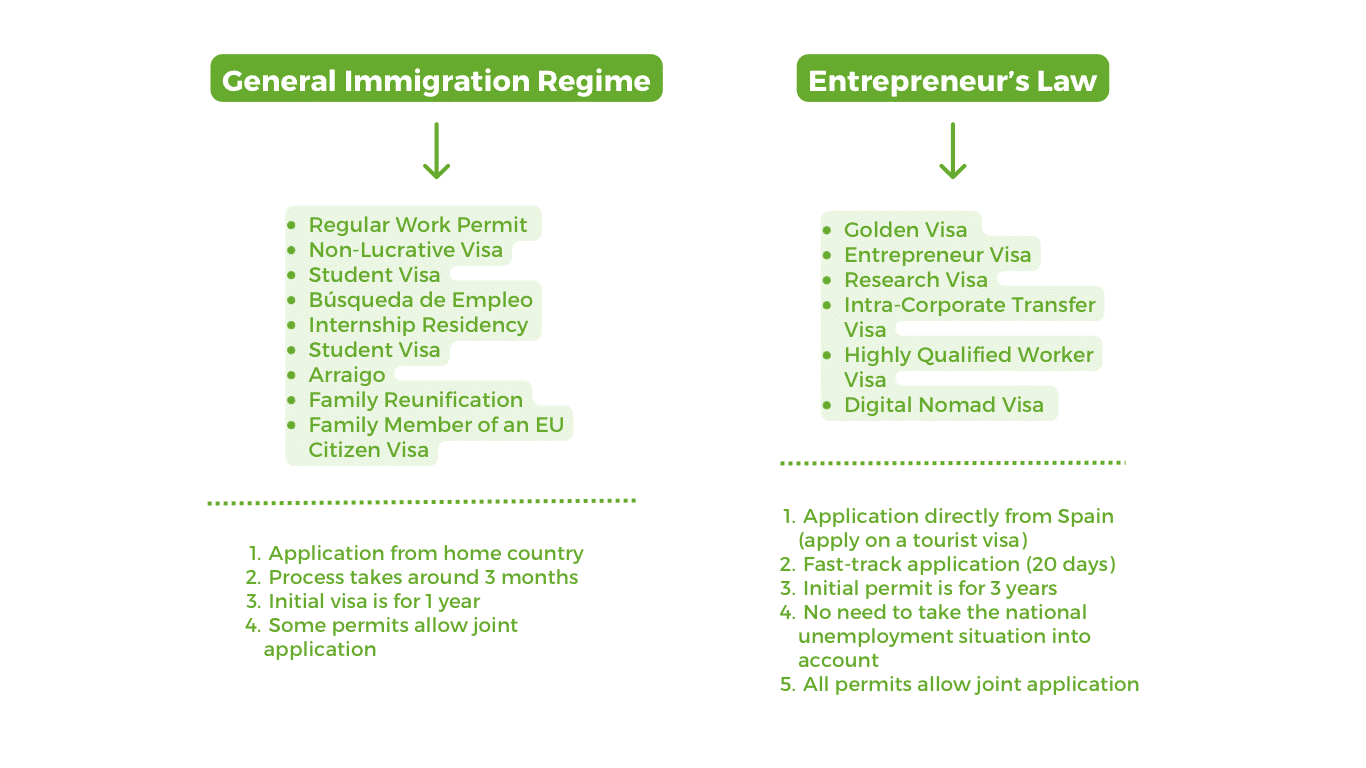
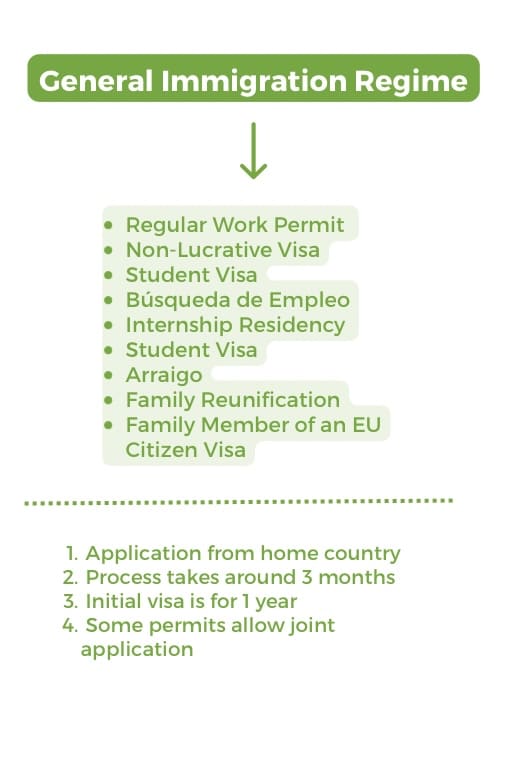
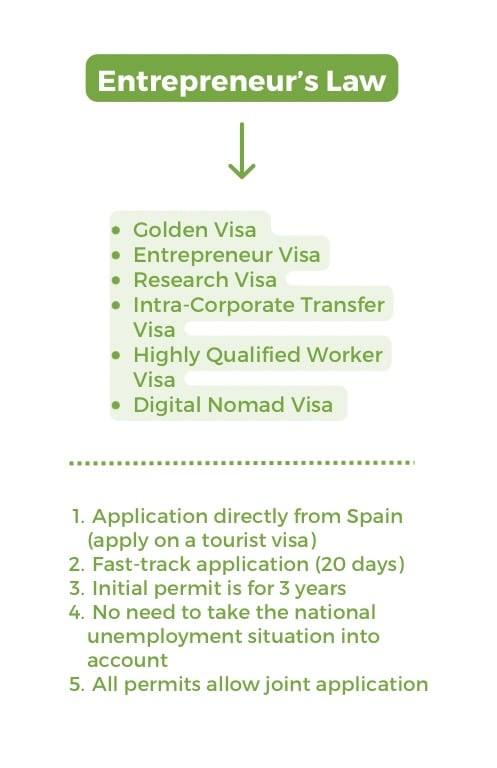
Non-lucrative Visa
Let’s say that you do not want to work in Spain. You would like to retire in Spain, or you want to travel around Spain and Europe for a year, or you would like to immerse yourself in a new culture without embarking on any economic activity. Then, the retirement or non-lucrative visa will be the best option for you. Its requirements are really straightforward:
- You need private health insurance.
- It is also required to demonstrate the possession of sufficient economic funds. The legal requirement is €28,800 but depending on your consulate that amount can increase (and you can even see that a rental contract is required).
There are two options to obtain this permit: apply from your country of origin, or directly from Spain but just if you are moving from another residency or from a student visa (as you can’t get an NLV as a tourist).
This is for sure one of the most sought permits in Spain, and at our offices we weekly receive clients from all countries who wish to obtain their non-lucrative visa as it offers a straightforward application and great advantages.
Digital Nomad Visa
This is a great option, as you can apply for it both from your country of origin and from Spain. Plus, thanks to being the holder of this residency, you will pay fewer taxes, (just a flat 24% on your income), as you will be able to benefit from the Beckham Law.
But this permit has many other advantages, like the ability to include your family members in the application, the possibility of receiving a resolution in less than 20 days (fast-track application), or the fact that it is a residence for 3 years (renewable for 2 until you obtain permanent residency).
When it comes to the main requirements, there needs to have already been an existing contract with the foreign company/client three months prior to the application, and this company must have already been operating for at least 1 year. For personal requirements, the individual must demonstrate sufficient economic funds through an annual salary of €31,752 for the main applicant. They must also prove that they have 3-years worth of work-related experience, or graduated from a reputable academic institution.
Golden Visa
Many of the residency permit application procedures can be tedious, long processes requiring a lot of documents and requirements. But in order to avoid this situation, the Investor Visa or Golden Visa may be the perfect solution. You just need to invest €500,000 in Spanish real estate and you will easily get your residency. The investor permit may be one of the easiest ways to start living in Spain, as it offers a fast-track application in just 20 labor days, it can be applied directly from Spain as a tourist, and allows you to include your relatives.
Furthermore, you will just need to visit Spain once per year in order to renew your golden visa, fact that will help you avoid becoming a tax resident in the country.
Entrepreneur Visa
If you just want to create a regular company, a work permit as a self-employed individual will be the best alternative, as the entrepreneur visa requires that your business idea is completely new and does not exist in the market already.
Bear in mind that one of the most important requirements for this permit is developing a business plan, in which you must specify how you will obtain financing, how your operations will work, a marketing plan, and how you will create employment for the Spanish economy. Our business lawyers will assist you in all steps to set up your business in Spain and with your tax optimization.
Student Visa
Its application process is also beneficial, as you can apply directly from Spain as a tourist within the first 60 days of your stay.
Besides, the student residence permit becomes many times the perfect gateway to enter Spain and stay for the long-run. That is because after completing your studies you can easily transition into a work permit, eliminating the complex work visa requirements.
If you are unable to find a job during your studies you can apply for the residency called “búsqueda de empleo”. This job search permit allows foreign students in Spain to extend their stay for up to two years to look for a job or start their own company. The student must have finished their studies at the time of application, and can apply for this permit 60 days before their student authorization expires or 90 days after.
Internship Residency
Research Visa
Work Permit
Obtaining a regular work permit in Spain can become a quite complex task, and that is why we always suggest to aim for any of its alternatives. Depending on your situation, professional profile and the job offer you have, there are different types of work visas you can apply for. Each has its own requirements and the application differs:
- The regular work permit must be applied for from your country of origin. Just a few job positions will be valid for this type of work permit (those under the shortage occupation list), which makes it really completed to be obtained. Your employer from Spain will be the one to request the residence permit for you, while you are in your country of origin (as it CANNOT be applied directly from Spain).
- If you have a job offer as a highly qualified worker, the procedure to get the residence permit can start while in Spain. This visa is granted to those who get an offer as managers or any other technical position, and who earn over €50,000 per year.
- The Intra-Corporate Transfer Visa applies to multinational company employees who need to relocate to the Spanish headquarters to continue working or to take any type of training.
- Similar to the skilled professional visa you also have the EU blue card, which allows you to work in the whole European Union area.
Family member of an EU Citizen visa (tarjeta comunitaria)
Family Reunification
Relatives, civil partners, and in-laws of Non-EU citizens residing in Spain can apply for family reunification, under the condition that the said foreigner living in Spain has been in the country for at least one year (with a valid permit). This residency card allows the applicant to live and work in the country.
When applying, the individual should show adequate housing conditions in Spain, and, as always, sufficient economic means. In the case of family reunification, the Spanish or European citizen needs to show that they can support their arriving relatives (i.e. the applicant). There are four main ways to do this. They can show that they are employed by a company, that they are a registered self-employed worker, that they are an enrolled student declaring financial support, or that they have at least 150% of IPREM.
Arraigo
Arraigo Social
If you have been living in Spain for 3 consecutive years, and have a valid employment contract or can demonstrate suffice to economic means, you can apply for arraigo social. This job offer must pay at least the minimum salary in Spain, and be of a minimum of 30 hours per week (but there is no minimum contract duration required).
Besides, you will need to obtain a favorable integration report. This is done through an interview with the town council of the relevant locality, showing a link with Spain (knowledge of culture and language), and learning about your background. In case you have relatives in Spain, there is no need to get this report. You will also need to speak a certain level of Spanish, and possibly the language of the autonomous community you are applying in (like Catalan in Catalonia).
Family Arraigo
If you can prove a direct family link (e.g. parents to child, a spouse, children, legal guardians and even caretakers of a Spanish citizen with a disability) to a Spanish citizen, residency via family arraigo can be requested regardless of time spent in Spain or economic means. This type of arraigo is granted for 5 years and does not require any minimum time in the country prior to its application.
Labor Arraigo
If you are currently in an irregular situation, but have been living in Spain for two consecutive years, and have been legally working under cuenta ajena or cuenta propia (i.e. for a company or as a freelancer), you can apply for labor arraigo.
For cuenta ajena, you should have been working 30 hours a week for a duration of six months, and 15 hours a week for a duration of one year. For cuenta propia, the individual should have been economically active for six months out of the two years in Spain.
Studies Arraigo
The studies arraigo is for you if you have been living in Spain for at least two years, and wish to begin specific studies or qualification training for employment. This job should be listed in the National Catalog of Professional Qualifications in the field of labor administration.
Keep in mind that the course needs to be 100% face-to-face and not part-time. You can study for 12 months (extendable up till a total of 18 months), but cannot work while studying. Nevertheless, once you finish your studies you will be able to move to a work permit.
You can find the list of valid centers and training in the following links:
How Balcells Group’s clients got their Spain residence permit successfully (and how you can, too)
Documents and application process to obtain Spanish residency
Now you know all your options to start living legally in Spain and obtaining residency as a non-EU foreigner. The next question is: how to get residency in Spain. Which documentation will I need to provide? Which conditions do I need to fulfill to be eligible?
Each residence permit is different. Each type of visa has its own requirements and differs in terms of the documentation you need to send to the Spanish Immigration Office. Nevertheless, there are certain commonalities that you will need to bear in mind no matter the path you choose.
Overall, the diagrams below show the general process you must follow when applying for Spanish residency either under the General Immigration Regime or Entrepreneur’s Law:
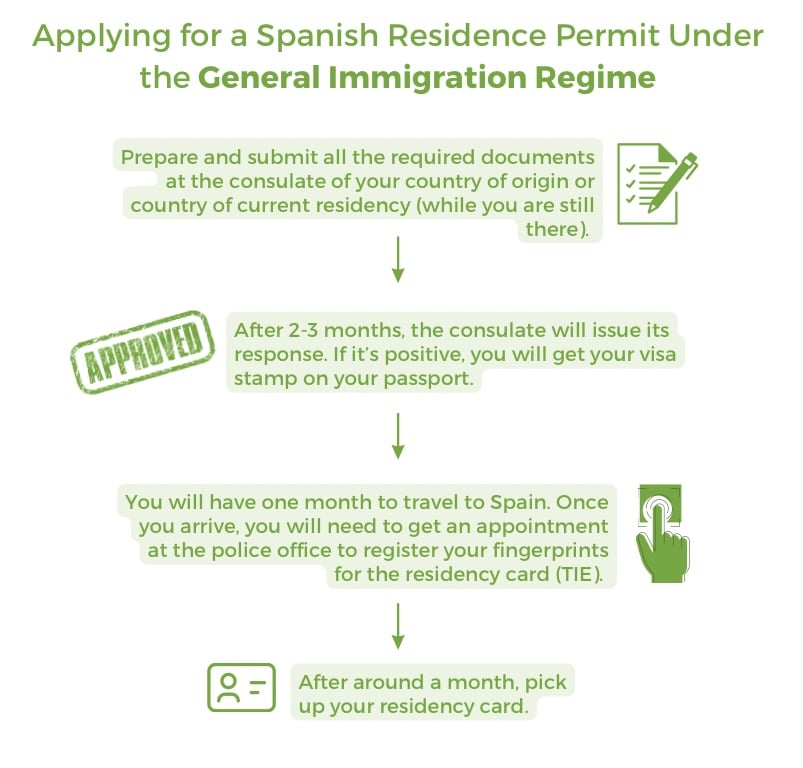
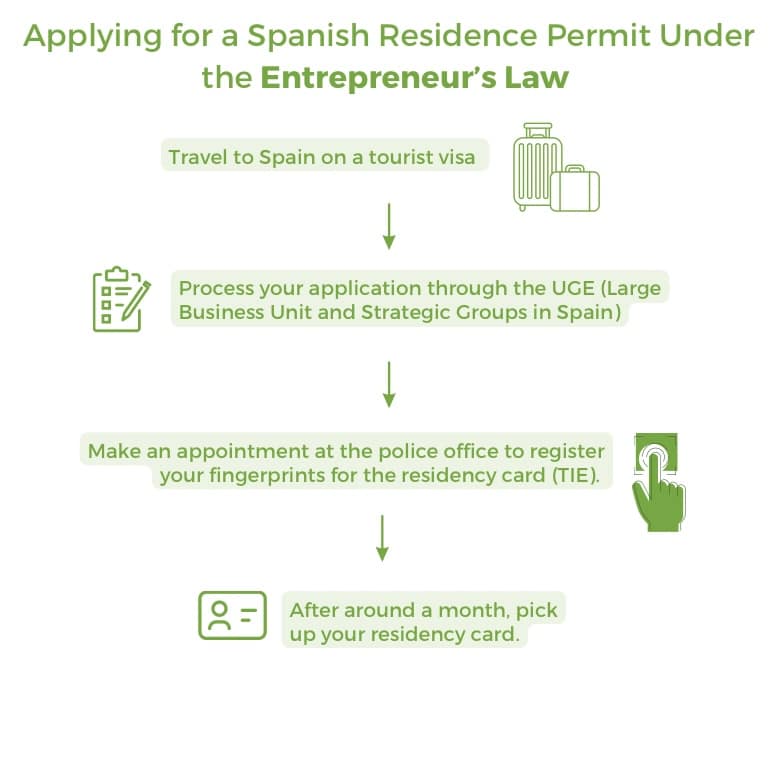
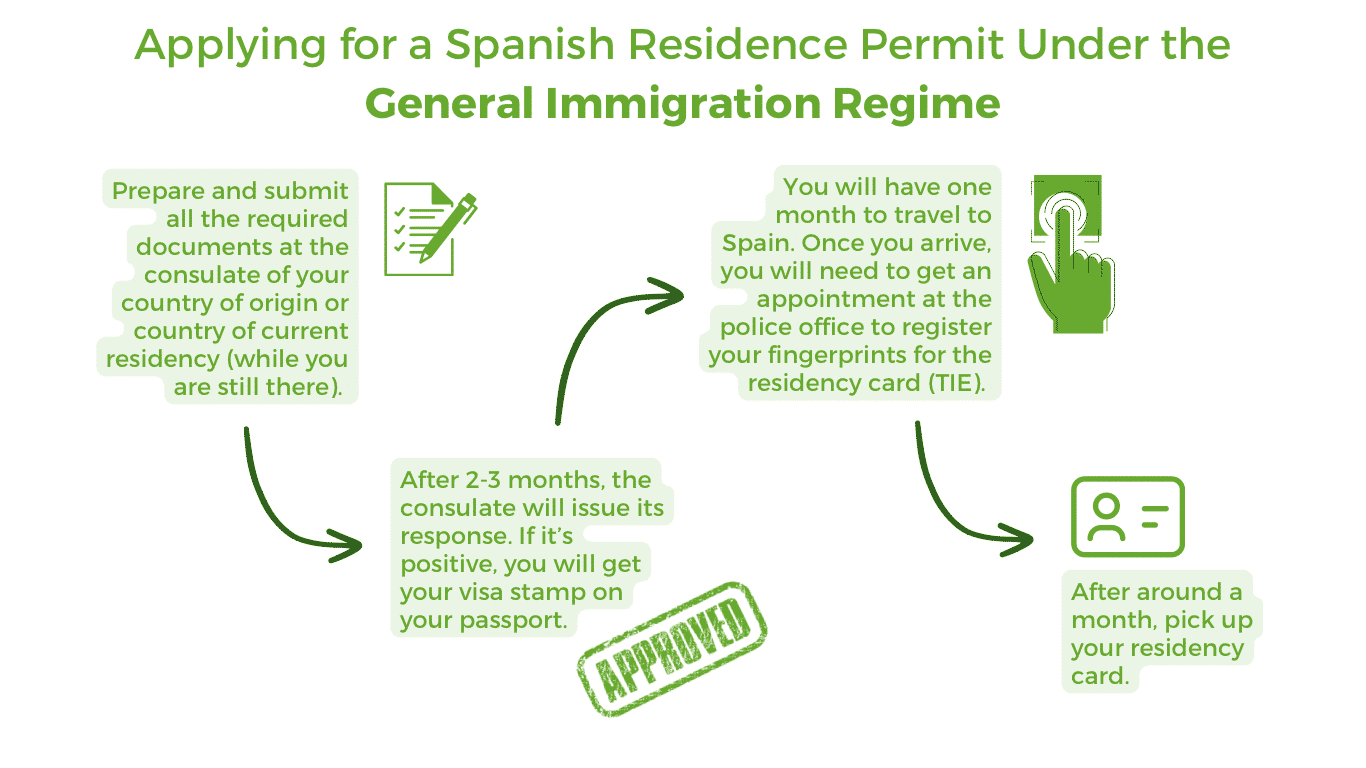
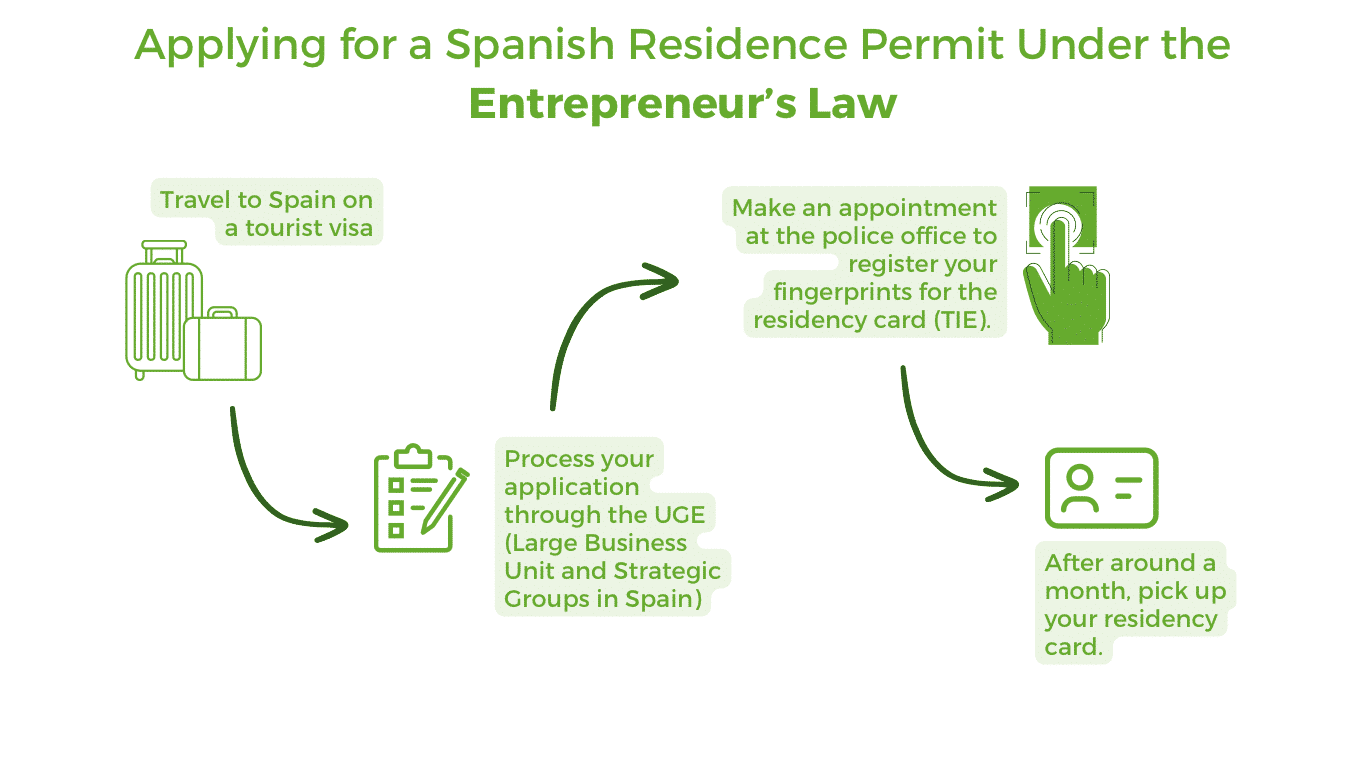
General Requirements and Documents
As we have seen, each residency has its own requirements. Nevertheless, there are certain documents you must always submit no matter your particular situation, and general requirements to be met. What are these?
- Make sure you have your NIE NUMBER. The NIE should be on your visa received at the consulate, as it is the basic identification number every expat needs in order to start a legal procedure in Spain. Opening a bank account, buying a property, acquiring a car or even applying for a regular residence permit will require you to have a NIE. Both EU-citizens and non-EU citizens need it.
- Upon arriving in Spain and finding a place to live, get your empadronamiento, as this is also a necessary requirement. It is a document that states you are registered at a certain address in the country.
- Prove that you have sufficient funds to sustain yourself in Spain. This amount changes depending on the residency card you apply for. You can show proof through a job contract, money in your bank, or via your activity as a self-employed worker. You can ask our lawyers for more information.
- Demonstrate clear criminal records for the last five years (not just in Spain, but in any country you have resided in during this period)
- Have health insurance with full coverage throughout the whole country, no matter whether it is public or private.
- Requirements specific to your residence permit
- Visa application form
- Payment of the corresponding administrative fee (exact price changes according to the permit, and some don’t have one)
- Copy of all the pages of your passport

We will submit your application online!
Our team will take care of managing your initial application or renewal completely online, so you don’t need to visit our offices and enjoy an effortless and easy process.
Everything You Need to Know About Spanish Residency (Frequently Asked Questions)
Can you apply for residency as a tourist?
- You want to get a student visa. You can enroll in any Spanish university as a tourist and process the application for your visa later on, without living Spain.
- The permit is under the Entrepreneur’s law; like the entrepreneur visa, golden visa, highly qualified work permit or digital nomad visa
- You are a family member of an EU citizen. You can enter Spain with your tourist visa, constitute your civil partnership or register your marriage, and then process your application
- It is an arraigo procedure, for which you must stay under an irregular status for 2 or 3 years first
Can my family apply with me?
Which laws regulate residence permits in Spain?
- The general immigration law
- The Entrepreneur’s law
- The EU regime (called régimen comunitario)
Depending on the type of visa or permit you apply for, you will fall under the regulations of one or the other.
How long does it take to get a residence permit in Spain?
On the other hand, in order to estimate the total amount it takes to get your permit, you should also consider how long it takes for you to prepare all the documents and when you can get an appointment to submit them.
That is why, in total, you can count 5-6 months as a general rule; even though it can go faster.
But there is an important exemption. If you are going to apply for any visa under Law 14/2013 (entrepreneur visa, HQV, digital nomad visa, etc.) you will enjoy a much faster resolution in just 20 labor days. That is thanks to the UGE (Unidad de Grandes Empresas) processing applications. And opposite to the general case, for these visas positive administrative silence applies, meaning that if after those 20 days you don’t get a resolution, your application is considered accepted.
How to get residency in Spain through investment?
Let our lawyers be in charge
Let our lawyers be in charge
